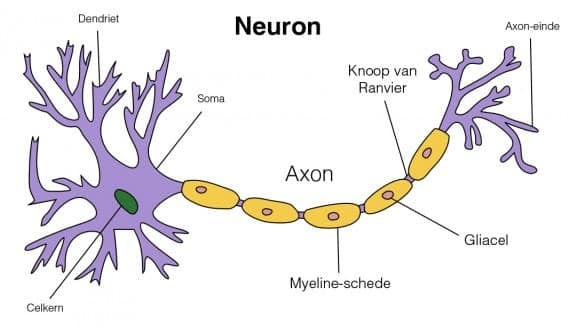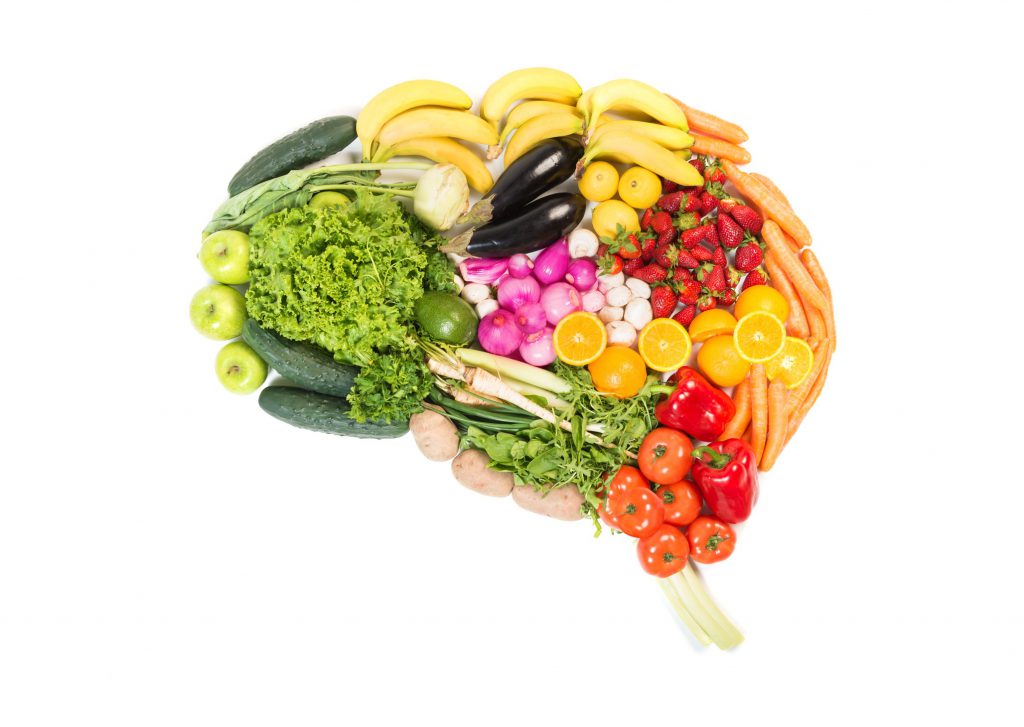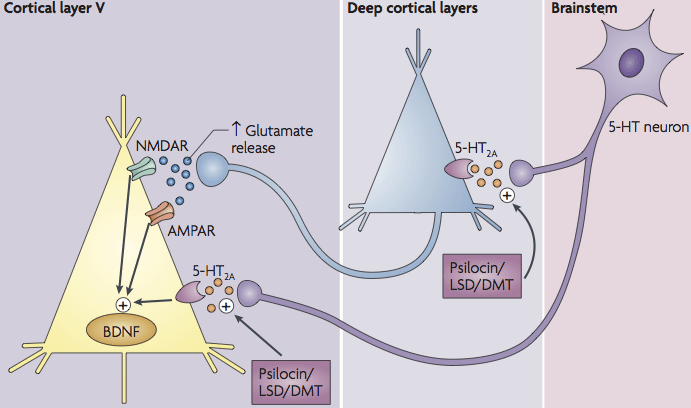Neurotrophins and Multiple Sclerosis
Neurotrophins such as Nerve Growth Factor (NGF) and Brain Derived Neurotropic Factor (BDNF) appear to be able to play a role in the creation and repair of new nerve cells. Thus, these neurotrophins can theoretically override the limiting effects of MS by allowing new nerve cells to be created. BDNF play a role particularly in the brain, and higher concentrations of BDNF are often measured in blood serum in individuals with MS. The idea behind the increased levels of BDNF is that the body makes BDNF to allow nerve cells to repair. However, in MS, the breakdown of myelin around the nerve cells accelerates faster than recovery, making the situation worse. A further increase in neurotrophins, particularly BDNF, could then theoretically mean faster recovery from breakdown.

Increase BDNF
BDNF can increase your remedy several things. Anti-inflammatory diet while avoiding pro-inflammatory sources is most important to be able to produce more BDNF. This is because inflammation products block the release of serotonin and serotonin is known to allow BDNF to be produced via the 5HT2a receptor. So stimulating the 5HT2a receptor plays a big role in getting more BDNF in fighting the effects of MS.
BDNF and serotonin
So more serotonin causes an increased release of BDNF through the 5HT2A receptor. So if we are going to look at how to stimulate the serotonin receptor more, we need to look at how to increase serotonin and how to keep the receptor sensitive to stimulation.
Also check out our earlier post on increase serotonin for more tips
Nutrition and lower BDNF
The foods below are known to trigger inflammatory responses and lower serotonin, which also lowers BDNF.
Sugar: Eating sugar and particularly fructose directly inhibits BDNF production and causes cognitive decline. Fructose along with glucose in one molecule is what we call table sugar. Avoid added sugar as much as possible. Also, sugar causes inflammatory responses in the body which reduces serotonin release.
Bad fats: Bad fats create inflammatory responses in the body and that causes a reduction in serotonin release via inflammatory factors. The bad fats are usually vegetable omega 6 fats used for frying such as sunflower, soybean and peanut oil. Hardened (vegetable) fats are also bad fats.
Dairy: Dairy can also be pro-inflammatory when consumed at high levels. It is best not to consume sweetened or unsweetened dairy products. So unsweetened kefir or yogurt can be eaten in moderation.
Gluten: Eat as few grain-based products as possible. Gluten can also cause inflammation, especially in allergic reactions. However, oats and thus oatmeal can be eaten.
Alcohol: Alcohol is fermented sugar and is best avoided entirely. If alcohol is drunk anyway, half to a full glass of wine a day can be consumed without too much harm. Above that, alcohol already becomes a pro-inflammatory.
Meat: Game, grass-fed meat and wild fish are no problem provided that red meat is eaten on a limited basis (recommendation is max. 2 times per week). Any fish that has not been wild-caught or fed other than natural is best not eaten. Grain- and corn-fed animal products are also not recommended.
Nutrition and higher BDNF
All anti-inflammatory foods and nutrients indirectly help increase BDNF. So all antioxidants, polyphenols and omega 3 are BDNF increasing. The building blocks of serotonin must also be in the diet, of course. Below are the BDNF increasing foods.

Complex carbohydrates: Complex carbohydrates are slow to digest and ensure stable blood sugar levels, thus reducing the need for insulin. This prevents insulin insensitivity and thus various inflammatory responses in the body. Also, most sources of complex carbohydrates also contain a lot of antioxidants and dietary fiber. It is advisable to take vegetables for half of all diet with 2 pieces of fruit per day and a little oats. Also, a handful of nuts a day can have a positive effect on serotonin production.
Omega-3: Omega 3 fatty acids DHA and EPA play important roles around the serotonin receptor. For example, EPA is an important anti-inflammatory and DHA makes the cell membrane of the 5HT receptor more sensitive to serotonin. DHA and EPA rich foods are fish, seafood and shellfish. Also, algae and krill are also high in EPA and DHA and the human body can also make them from the Omega 3 fatty acid ALA, which is commonly found in flaxseed oil and walnuts (oil).
Omega-6: Whereas we take in omega 6 in abundance and we really should limit intake, GLA (gamma linolenic acid), an omega 6 fatty acid can help us against inflammation. This infrequent omega 6 fatty acid the body has limited ability to produce. Supplementation can be with Borage Oil (Borogo Officinales), Middle Evening Primrose Oil (Oenothera Biennis) or Blackcurrant Seed Oil (Ribis Nigrem).
Polyphenols and antioxidants: Antioxidants and especially the polyphenols work very well against oxidizing body molecules because they can absorb free radicals such as free oxygen. With this, the body prevents inflammation from oxidation (like iron can rust). Almost all natural plant foods are full of polyphenols and antioxidants. The better a food absorbs free radicals, the higher its ORAC value, which stands for Oxygen Radical Absorbance Capacity.
View a list of ORAC values
Tryptophan-rich foods: Tryptophan is the precursor to 5-HTP and serotonin and thus must come in through food. foods high in tryptophan include oatmeal, nuts, seeds, spirulina, cocoa (pure), sesame seeds, chickpeas, spinach, sunflower seeds, parsley, asparagus, mushrooms, broccoli, beans, nuts, seeds, soybeans and turkey.
Vitamin B: Vitamins B3, B6, and B12 are excipients in the formation of serotonin. Foods that can provide the B vitamins are (grass-fed) meat, fish, (acidified) dairy, whole grains, vegetables, fruits, potatoes, legumes, eggs, and (cashew) nuts. A vegan should supplement B12 because B12 is found only in animal foods.
Minerals: Minerals such as zinc, iron and magnesium play an important role in very many biochemical processes in the body, including the formation of serotonin. Eat as many vegetables as possible, and if you cook vegetables, cook them as briefly as possible. Combine with as many vegetables as you can get in. Vary with nuts such as cashews, pistachios, walnuts and pecans. Cocoa in pure unprocessed form is very mineral-rich. Whole grain cereals such as brown rice and oats (malt) are also good sources of minerals.
MAO inhibitor foods: MAO is an enzyme that breaks down serotonin, among other things. This is a natural process which should take place. However, with certain foods the MAO activity can be slowed down in a healthy way and in moderation so that serotonin is broken down less quickly. Seaweed, turmeric, passion flower and rhodiola are mild MAO inhibitors.
Supplements and BDNF
We wrote earlier about supplements that can increase serotonin and thus BDNF. If diet is not enough, you can also take supplements.
View the serotonin-boosting supplements
Gut flora and BDNF
The right nutrients are needed to make BDNF via serotonin. In the intestines, it is the bacteria that pre-digest many of the important substances for you. Without the pre-digestion, we cannot get all the substances the body needs. So first, make sure you have the right bacteria in your intestines by taking a probiotic that contains one or more of the following strains: Lactobacillusacidophilus, Lactobacillus casei and Bifidobacterium bifidum. Then give those bacteria and yourself the proper nutrition and dietary fiber from mainly vegetables, legumes, moderate fruits and a little whole grain products such as oatmeal.
Physical activity and BDNF
Cardiotraining triggers the production of a protein called FNDC5 ( ibronectin type III domain-containing protein 5). FNDC5, in turn, increases BDNF by 200-300%. The increase is of long duration. In a study of men who cycled daily for 3 months, BDNF levels nearly quadrupled.
Regular strength training also increases BDNF, but that only lasts until only a few minutes after exercise. A better form of training is interval training or any sport where high intensity and rest are alternated.
Sleep and BDNF
Deep sleep triggers a release of melatonin DMT, which both concerning form resembles serotonin and thus also activates the 5HT2a receptor. As a result, the body releases BDNF during the deeper stages of sleep. There are four sleep stages that repeat every 90 minutes. On average, you spend about a third to half the night in stages 3 and 4. During this stage, the activity of DMT and BDNF is highest.
Meditation and BDNF
Meditation reduces stress and thus it increases BDNF. A good and deep meditation causes the body to "think" it is asleep and releases DMT. DMT, through the stimulation of the 5HT2a receptor, causes more BDNF to be released. The same goes for breathing techniques where it appears to the body that it is sleeping.
Sunlight and BDNF
Sun exposure increases BDNF by increasing vitamin D. It also improves mood, and actually reduces your risk of skin cancer, provided you don't burn yourself. Go outside in direct sunlight for 15 minutes a day. Unfortunately, in winter the sun is not strong enough. Supplementation with vitamin D or eating fatty fish, liver, cheese (least good choice) or egg yolks can help you get vitamin D in winter.
Social contact and BDNF
Lack of meaningful mental stimulation leads to lower BDNF levels. Social isolation also contributes to depression, reducing BDNF. Reduce social media use and connect in real life. Conversations with strangers does BDNF very well and makes you feel good afterwards.
MDMA against MS
MDMA causes a release of serotonin and dopamine. Due to the increased activity of serotonin, more BDNF will be released via the 5HT2a receptor and this could have a positive effect in the treatment of MS. However, the disadvantage of MDMA is that during the days after using MDMA, serotonin is depleted and you then have too low levels. Because of this dip, we think there are better other choices.
Other psychedelics and BDNF
Psychedelics increase BDNF production and neurogenesis. This explains why so many studies have emerged recently about psychedelic-assisted therapy helping with depression and PTSD.
The highest possible stimulation of the 5HT2a receptor to release BDNF is the use of psychedelics that do not deplete their own stores of serotonin. So these are really mind-altering drugs (English for medication). Psilocin from magic mushrooms, DMT from ayahuasca or LSD stimulates the 5HT2a receptor such that BDNF also goes up significantly. This combination causes neurogenesis, which means the creation of new neurons, at a level that is unprecedented. The well-known psychedelics with the highest binding to the 5HT2a receptors are LSD and psilocin (psilocybin is the prodrug).

Scientific evidence of beneficial effects of psychedelics
Whether magic mushrooms and increasing BDNF can help cure MS remains to be proven. In any case, the theory behind increasing BDNF to fight MS sounds very plausible. So when asked if magic mushrooms can help cure MS, at this point we can only answer that we do think it helps. Researchers are now trying to produce derivatives of psilocin that do have high binding to the 5HT2a receptors but do not produce hallucinations. For now, MDMA does not seem to be the most appropriate solution for treating MS. We believe that occasional high doses of Psilocybin/psilocin (magic mushroom/truffles) have the most impact. Microdosing with legal LSD variants could also be explored further.
Would you like to try psilocybin against MS?
The doses of psilocybin/psilocin that have an effect on BDNF are on the high side. In this, you will hallucinate, and you could also use the hallucinations to gain insights from them. Thus, these sessions can be stress relieving in the long run, which in turn is good for your health. You can be guided by experts in this field. You can fill in the intake form at triptherapy.com.
